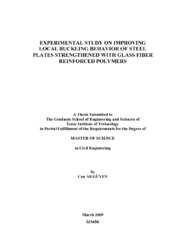Please use this identifier to cite or link to this item:
https://hdl.handle.net/11147/4043Full metadata record
| DC Field | Value | Language |
|---|---|---|
| dc.contributor.advisor | Eğilmez, Oğuz Özgür | - |
| dc.contributor.author | Güven, Can Ali | - |
| dc.date.accessioned | 2014-07-22T13:53:03Z | |
| dc.date.available | 2014-07-22T13:53:03Z | |
| dc.date.issued | 2009 | - |
| dc.identifier.uri | http://hdl.handle.net/11147/4043 | - |
| dc.description | Thesis (Master)--Izmir Institute of Technology, Civil Engineering, Izmir, 2009 | en_US |
| dc.description | Includes bibliographical references (leaves: 87-91) | en_US |
| dc.description | Text in English; Abstract: Turkish and Enlish | en_US |
| dc.description | xi, 91 leaves | en_US |
| dc.description.abstract | Glass Fiber Reinforced Polymer (GFRP) applications becoming one of the most efficient strengthening methods to improve mechanical properties of previously built steel structures. In strengthening applications FRP materials generally used in web or flange sections of steel members to provide a bracing against local buckling. By the help of their easy application and their tailorable mechanical properties, FRPs provide various options for selecting the most suitable FRP material for applications. This study focuses on using GFRP to enhance the buckling behavior of GFRPstrengthened steel plates under axial loading. For that purpose, a detailed experimental study program has been followed revealing mechanical properties of GFRP material, steel and interaction between steel-GFRP. Previous studies showed that the surface bond between GFRP and steel section as the weakest link of the structure. As a result of this, various epoxies, surface preparation primers, surface treatments are used to produce Lap-Shear specimens to provide most efficient surface interaction between GFRP and steel. Results of these experiments provided us data to decide most suitable surface treatment, surface primer and epoxy combination in the GFRP Strengthened Steel Plate Tests with the ability to in-situ application. 350x200x20 mm steel plates are strengthened with various thickness (2, 4 and 16 layers) and surface areas (80mm x 300mm, 160 x 300mm) of GFRP to compare the stabilization in buckling values with bare steel plates. Plates are strengthened with GFRP on both sides and they are tested in compression testing equipment. LVDTs are used to collect axial and lateral buckling while strain-gauges attached to both composite used to collect axial and lateral buckling while strain-gauges attached to both composite plates strengthened with GFRP material showed that application of GFRP provides enhancement to the plastic buckling of steel plates. | en_US |
| dc.language.iso | en | en_US |
| dc.publisher | Izmir Institute of Technology | en_US |
| dc.publisher | Izmir Institute of Technology | en_US |
| dc.rights | info:eu-repo/semantics/openAccess | en_US |
| dc.subject.lcc | TA412. G98 2009 | en |
| dc.subject.lcsh | Building materials--Testing | en |
| dc.subject.lcsh | Strenght of materials | en |
| dc.subject.lcsh | Plates,iron and steel--Testing | en |
| dc.subject.lcsh | Glass fibers | en |
| dc.title | Experimental Study on Improving Local Buckling Behavior of Steel Plates Strengthened With Glass Fiber Reinforced Polymers | en_US |
| dc.type | Master Thesis | en_US |
| dc.institutionauthor | Güven, Can Ali | - |
| dc.department | Thesis (Master)--İzmir Institute of Technology, Civil Engineering | en_US |
| dc.relation.publicationcategory | Tez | en_US |
| dc.identifier.wosquality | N/A | - |
| dc.identifier.scopusquality | N/A | - |
| item.openairecristype | http://purl.org/coar/resource_type/c_18cf | - |
| item.languageiso639-1 | en | - |
| item.openairetype | Master Thesis | - |
| item.grantfulltext | open | - |
| item.fulltext | With Fulltext | - |
| item.cerifentitytype | Publications | - |
| Appears in Collections: | Master Degree / Yüksek Lisans Tezleri | |
Files in This Item:
| File | Description | Size | Format | |
|---|---|---|---|---|
| T000784.pdf | MasterThesis | 5.26 MB | Adobe PDF |  View/Open |
CORE Recommender
Page view(s)
192
checked on Mar 31, 2025
Download(s)
140
checked on Mar 31, 2025
Google ScholarTM
Check
Items in GCRIS Repository are protected by copyright, with all rights reserved, unless otherwise indicated.